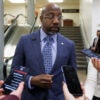Tuesday, the 10th U.S. Circuit Court of Appeals ruled against the Little Sisters of the Poor in its challenge to the coercive Obamacare abortion drug mandate.
Along with several other non-profit religious organizations, the Little Sisters challenged the Affordable Care Act requirement that it provide employees with health care coverage that includes contraceptives, sterilization, and abortion-inducing drugs and devices.
The government allows groups, such as the Little Sisters, to fill out a form notifying the Department of Health and Human Services of their religious objection to providing such coverage.
This notification initiates the process of the government’s requiring insurers and third-party administrators to provide the mandated coverage to employees at no cost.
The government considers the second option a way to accommodate the Little Sisters’ religious beliefs.
For many religious employers, this alternative to directly providing coverage doesn’t assuage their moral objections.
The Little Sisters maintain that filling out this form makes it complicit in the facilitation of potentially life-ending drugs and devices, which substantially burdens its free exercise of religion.
The 10th Circuit panel disagreed, finding that the accommodation “relieves [the Little Sisters] of their statutory obligation” to provide the objectionable coverage.
The panel wrote that the Little Sisters are wrong about the legal effect of filling out this form because “[f]ederal law, not the form or notification of HHS, provides contraceptive coverage.”
Thus, in the panel’s view, the Little Sisters’ argument that its act triggers coverage “fails to establish any burden” on their religious exercise, and even if it did establish a burden, the panel reasoned, “de minimis administrative tasks do not substantially burden religious exercise.”
But the U.S. Supreme Court ruled otherwise more than 30 years ago in Thomas v. Review Board.
In this case, a Jehovah’s Witness steelworker was denied unemployment benefits after quitting his job because he was transferred to a part of his company that made weapons.
Because of his belief in non-violence, Thomas could not participate in the manufacture of weapons.
In siding with Thomas, the Supreme Court noted that “[I]t is not within the judicial function and judicial competence to inquire whether [Thomas] correctly perceived the commands of [his] faith. Courts are not arbiters of scriptural interpretation.”
Instead, the court would defer to a religious believer’s interpretation unless the claim was so bizarre or had a non-religious motivation (even the government concedes these do not apply to the Little Sisters).
The court reaffirmed this limitation in Burwell v. Hobby Lobby (2014), a challenge to the Obamacare mandate brought by for-profit employers. The court wrote that the government would “in effect tell the plaintiffs that their beliefs are flawed. For good reason, we have repeatedly refused to take such a step.”
The 10th Circuit panel, however, found that Thomas does not prevent a court from “examining the relationship between a sincerely held religious belief and the alleged burden imposed by the Government.”
Yet courts should not be in the business of drawing the lines when it comes to theological questions.
Unfortunately, that is precisely what the 10th Circuit and four other appellate courts have done.
Though the government may believe this accommodation is sufficient to distance religious employers from acts they find morally objectionable, the Little Sisters (and many others) clearly do not agree.
As the Little Sisters explained in a brief filed with the 10th Circuit, the accommodation “merely offers [them] another way to violate their religion.”
One judge dissented in part, drawing a distinction between insured and self-insured employers, but he voted against the Little Sisters, noting that they “have not shown that their opting out will necessarily cause their plan participants and beneficiaries to receive contraceptive coverage.”
This is not the end of the road for the myriad religious organizations challenging the accommodation.
Four petitions are pending before the Supreme Court, and at the end of June, Justice Samuel Alito granted temporary relief to Pennsylvania-based religious groups in their case.
There’s a good chance the Supreme Court will take up the issue in its next term, which begins in October.
The justices will return in late September for a “mega-conference” to consider petitions filed over the summer.
Since the five appellate courts that have considered the accommodation have all ruled in favor of the government, the justices may wait until an appeals court rules for the challengers, creating a “circuit split,” before agreeing to hear one of the nonprofit challenges.






























